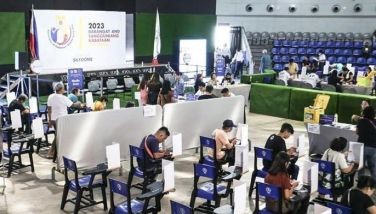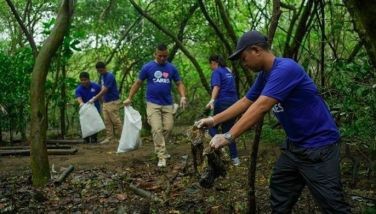Are we ready?

Wars, droughts, floods… Are we ready? A drought in China was so bad it dried up one of its large freshwater lakes. Agricultural analysts say rice production is most vulnerable.
“I think the biggest impact of the heat wave is going to be on the rice crop – corn also has issues, but not that much,” an expert in Sydney told Reuters.
China, the world’s biggest rice consumer and importer, was already expected to import a record six million tons in 2022/2023, according to estimates from the US Department of Agriculture.
No wonder Rep. Joey Salceda sounded an early alarm last month that the country might suffer a rice shortage soon, following the reported drought in the Yangtze River area in China. Leonardo Montemayor of the Federation of Free Farmers thinks we will have enough rice until yearend. But what if he is wrong?
“If a global shortage takes place, rice prices could increase to P48 per kilogram by November, unless the country sees a strong dry season harvest and secures import contracts from foreign governments,” Salceda warned.
There are indications the flow of the Mekong River from China to Thailand and Vietnam may be restricted by drought, as well as the dams the Chinese have been building.
“That’s not good for our rice supply because Thailand and Vietnam rely heavily on the Mekong for rice production,” Salceda said.
“I’m not trying to sound negative, given all the other crises we have to deal with, but I think now that we can see the problems ahead before they can come, we have a chance to act,” Rep. Joey said.
“We have a 30-day window before the dry cropping season starts. Crucial 30 days for action,” Salceda pointed out, calling on the Department of Agriculture for “heavy support” on the rice crop dry season and “secure contracts on imports to guarantee rice supply.”
It is worse than that, according to some experts I have talked to. Apparently, the DA failed to provide fertilizer assistance to farmers in a timely manner, and because the price of urea has more than doubled, many farmers failed to buy what they needed.
That means the next rice harvest will be less than normal. Farmers have been cash strapped, with about 400,000 rice farmers still waiting to get their P5k financial assistance for 2021, according to Montemayor. That should have been given out about this time last year.
That’s on top of what is due this year, as well as the seedling and fertilizer aid under the Rice Competitiveness Enhancement Program. It isn’t because the government does not have funds because it already has the money from the rice import duties collected last year.
By some estimates, we will need to import as much as three million metric tons. Otherwise, rice prices will go up as we approach Christmas and that’s going to be politically ugly.
It isn’t going to be easy to source that much rice in the light of looming shortages in China, Bangladesh, and other countries. These countries will be lining up to buy their supply from the same countries we buy our rice from – Thailand and Vietnam.
According to the latest report of the USDA, global rice production is forecast lower this month, with reduced production for India and Bangladesh.
“Global consumption is up, primarily in India where increased government distributions of rice are compensating for lower wheat distributions. Global stocks are down mostly due to decreases for India, Thailand, and Vietnam.
“Imports are forecast up due to higher demand from Bangladesh, the Philippines, and Iraq.”
Does the administration have enough sense and market foresight to address a looming rice crisis? If we get the kind of reaction we saw with the fairly simple sugar crisis, we are in trouble.
We can no longer depend on the technocrats after what happened to former Usec. Leocadio Sebastian over the sugar importation order. The technocrats will hesitate to recommend a course of action, and just wait for clear orders from Junior. That may come too late.
The agriculture bureaucracy is largely office bound and is no match to the trading cartels that run rice, sugar, corn, garlic, onion, etc. The private rice traders may decide not to import in time because a supply shortage works to their advantage.
Junior’s problem is that NFA can no longer import the buffer stock needed to keep the price of rice from going up. Maybe Junior can harness the big private conglomerates to import rice. It is easier to control, for example, San Miguel and URC than the shadowy rice cartels working out of dark bodegas in Binondo and Divisoria.
San Miguel and URC also have facilities to unload and store bulk shipments of grains in temperature and humidity-controlled storage. They also have distribution networks at their command.
Indeed, they can also be used to buy rice from our farmers at prices that will force traders not to shortchange our farmers. San Miguel, through its B-Meg network, has the means to reach the farmers.
Using the conglomerates to perform the functions once done by NFA to stabilize rice supply and retail price is a novel way to address the problem in this era of rice trade liberalization. A little nudge from Junior should be enough to get the conglomerates to cooperate, the way they did with the retail price of sugar.
Beyond this looming emergency, Junior has to revamp our approach to agriculture. The biggest challenge is enhancing farm productivity. Junior must consolidate farms, require irrigated farms to plant hybrid rice, provide more efficiently the financing farmers need and help farmers market their produce.
Make sure the function of providing tech support to farmers that was devolved to LGUs is done professionally. Local politicians are more interested in giving seeds, fertilizer, and equipment because of the money they can make buying these.
The DA is getting a substantial budget boost. Hopefully, they don’t use it up in workshops and seminars.
What the farmers need is an environment that will make farming profitable for them. Otherwise, farmers may just grow enough for their needs and the rest of us can go hungry.
Boo Chanco’s email address is bchanco@gmail.com. Follow him on Twitter @boochanco.
- Latest
- Trending






















